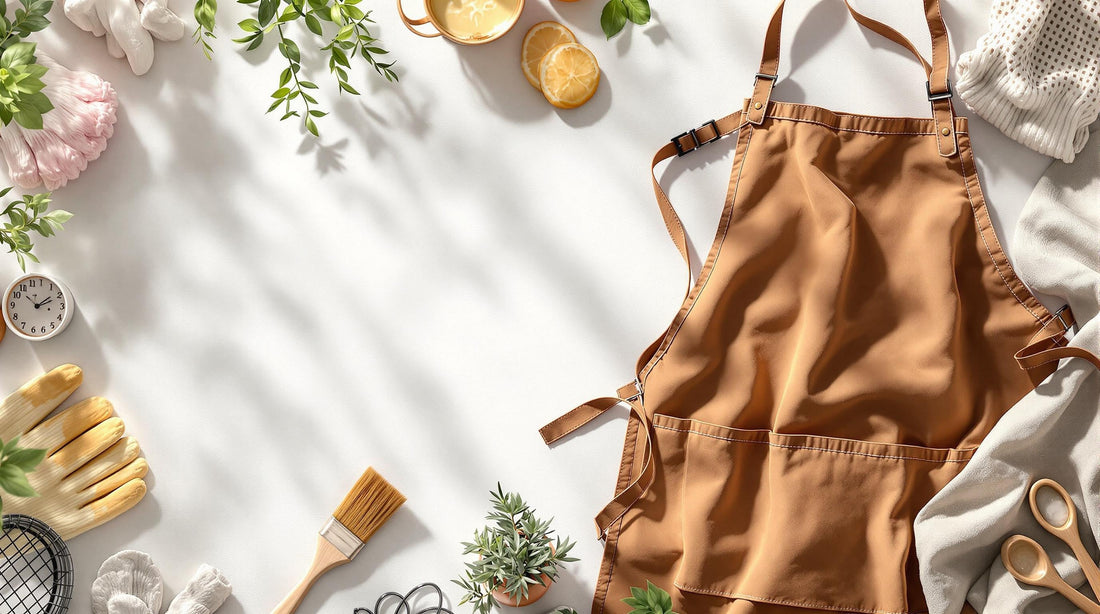
Best Materials for Ergonomic Aprons
Share
Choosing the right apron material is crucial for comfort, back support, and productivity during long work hours. Here's a quick breakdown of the best materials and their benefits:
- Cotton: Lightweight, breathable, and easy to clean. Ideal for home cooking or light tasks.
- Denim: Durable and well-balanced for professional kitchens or workshops.
- Canvas: Tough, water-resistant, and long-lasting. Perfect for heavy-duty tasks.
- Leather: Extremely durable with excellent heat protection. Best for high-heat environments or professional workshops.
Quick Comparison
| Material | Pros | Cons | Best For |
|---|---|---|---|
| Cotton | Lightweight, breathable, easy to clean | Less durable, minimal support | Home cooking, light tasks |
| Denim | Strong, durable, resists wear | Heavier, less breathable | Professional kitchens, workshops |
| Canvas | Water-resistant, long-lasting | Stiff, moderate weight | Heavy-duty tasks, outdoor cooking |
| Leather | Heat-resistant, molds to body | Heaviest, needs upkeep | High-heat settings, workshops |
For ergonomic comfort, choose materials like canvas or denim for demanding tasks, and cotton for lighter use. Leather is ideal for maximum protection in tough environments.
1. Cotton Aprons
Comfort and Weight
Cotton aprons are known for being soft, breathable, and lightweight, making them a comfortable option for long shifts. Their design helps prevent overheating and reduces strain on the shoulders and back, making them easy to wear for extended periods [2]. Plus, their natural properties help avoid skin irritation, even during prolonged use [3]. Compared to heavier materials like denim or leather, cotton aprons are much lighter, which helps minimize back strain [2].
Durability
When made with dense weaves, reinforced stitching, and pre-shrunk fabric, high-quality cotton aprons can hold up well for daily use. While they may not be as tough as denim or canvas, their durability largely depends on the thickness and weave of the fabric [2].
Ease of Maintenance
Cotton aprons are easy to care for. They’re machine washable, quick to dry, and require minimal effort - just stick to cold washes and low heat for the best results [2][3].
Cotton works well for lighter tasks, but for more demanding environments, materials like denim might be a better fit due to their added strength.
2. Denim Aprons
Durability
Denim aprons are built to last, thanks to their tough texture and tightly woven fabric. Features like double stitching, bartacking, and metal rivets at stress points make them ideal for handling the wear and tear of daily use [6].
Comfort and Weight
The comfort of a denim apron depends on the thickness of the fabric. Lighter denim is more flexible and better suited for long hours of wear [6]. High-end options often include thoughtful design elements like cross-back straps, adjustable neck straps, and well-placed pockets. These features help distribute weight evenly, reducing back strain when carrying tools or working through extended shifts [2].
Ease of Maintenance
Keeping denim aprons clean is straightforward - they hold up well to frequent washing without losing their durability. For the best results, wash them in cold or lukewarm water, air dry, and address stains as quickly as possible [2][3].
"High-quality denim aprons are designed to withstand everyday work pressures through features like double stitching, bartacking, generous pockets, metal rivets, and eyelets", according to industry research [6].
Denim aprons are a solid choice for professional settings that demand both durability and comfort. They offer excellent protection while allowing for ease of movement, making them especially useful for chefs, baristas, and artisans who need reliable gear for long hours [2].
If you're looking for an alternative, canvas aprons provide similar toughness but with a different feel and weight.
3. Canvas Aprons
Durability
Canvas aprons are crafted from tough cotton fibers, which makes them long-lasting and resistant to wear and tear. Many are treated to repel water and stains, giving them an edge in messy or demanding tasks [5]. These treatments help them stand up to spills and heavy dirt, making them a reliable choice for challenging work settings [2][3].
Comfort and Weight
Canvas aprons focus on protection, but modern designs also prioritize comfort. Thanks to its breathable nature, canvas feels more comfortable during extended use [5]. However, the material's density makes these aprons heavier than cotton or denim options. To counter this, adjustable straps and thoughtful weight distribution features are often included, reducing strain on the back and shoulders during long hours of wear [2][3].
Ease of Maintenance
Cleaning canvas aprons is straightforward, thanks to their stain-resistant finish [5]. Their tough construction means they retain their protective qualities even with frequent washes [2][3]. For best results, machine wash them in cold or warm water and air dry to maintain their shape and durability. Treat stains promptly to keep them looking good, and reapply water-resistant treatments occasionally to maintain their protective features.
Canvas aprons are a top choice for professional kitchens, where spills and stains are common. Their blend of strength and easy upkeep makes them ideal for commercial cooking or outdoor grilling [2][3]. While canvas is outstanding for durability and protection, leather aprons bring a distinct mix of style and toughness to professional settings.
4. Leather Aprons
Durability
Leather aprons are known for their long-lasting and tough nature, making them ideal for challenging environments. Their sturdy build resists high temperatures, heavy wear, and sharp objects, thanks to reinforced stitching and specially treated surfaces [2][3]. This makes leather aprons a top choice for protection against heat, spills, and physical damage.
Comfort and Weight
While leather aprons provide excellent protection, they can feel a bit heavy. Modern designs address this issue with cross-back straps and adjustable features that evenly distribute weight, reducing strain on the neck and shoulders. Over time, leather molds to the wearer’s body, making it more comfortable despite its initial heft [1][2]. Cross-back straps are especially important for managing the weight of leather aprons, ensuring a more balanced fit.
Ease of Maintenance
Proper care is key to keeping leather aprons functional and comfortable [2][7]. Here’s a simple maintenance guide:
| Task | Purpose |
|---|---|
| Surface cleaning | Removes dirt, debris, and stains |
| Conditioning | Keeps leather flexible and waterproof |
By following these steps, you can maintain the apron’s flexibility and protective qualities over time [3].
Leather aprons are a great choice for settings that demand maximum protection, such as kitchens and workshops exposed to heat and heavy use [2][3]. While they require more upkeep compared to other materials, their durability and protective features make them a smart investment for tough environments.
sbb-itb-c693c43
Shop Aprons: Comparing Canvas and Denim Materials
Pros and Cons Summary
After reviewing various apron materials for support and comfort, here's a breakdown of their main features:
| Material | Pros | Cons | Ideal Use |
|---|---|---|---|
| Cotton | • Lightweight and breathable • Easy to care for |
• Offers little support • Less durable |
• Home cooking • Light kitchen tasks |
| Denim | • Strong and durable • Resists wear and tear |
• Heavier material • Limited breathability |
• Professional kitchens • Workshops • Studios |
| Canvas | • Resists water and stains • Long-lasting |
• Starts off stiff • Moderate weight |
• Heavy-duty tasks • Outdoor cooking |
| Leather | • Excellent protection • Extremely durable • Molds to the body |
• Heaviest option • Needs regular care • Poor ventilation |
• High-heat environments • Professional workshops |
This table shows how different materials suit specific needs, making it easier to choose based on your work environment and how long you'll be wearing the apron [2][3].
Cotton is great for light tasks at home, while denim stands out for its durability in professional settings. Canvas is ideal for heavy-duty tasks, and leather offers unmatched protection and durability, especially in high-heat or intensive work environments. For ergonomic comfort, consider how the material supports your tasks and how long you'll wear it. Professional kitchens and workshops often benefit from denim or canvas, while cotton works well for casual home use [2][6].
Choosing the right material ensures comfort and protection while supporting your back during long hours of use.
Conclusion
The material of your apron plays a key role in comfort and physical well-being, especially during long hours of work. For professionals in high-demand settings, denim and canvas stand out for their durability and ability to provide solid back support. Canvas, in particular, offers a balance of strength and comfort, making it a great option for tasks requiring water resistance and stain protection [5].
For lighter tasks, cotton is a breathable option, perfect for casual cooking or short-term use. In contrast, heavier materials like leather and canvas are better suited for professional kitchens or workshops, especially when paired with features like adjustable straps to evenly distribute weight and reduce strain [1].
Here’s a quick guide to choosing the right material:
- Canvas or denim: Ideal for long work hours and demanding environments.
- Leather: Best for tasks involving high heat.
- Cotton: Perfect for casual or short-term use.
Choosing the right apron material and features can help prevent discomfort and reduce the risk of long-term health issues. By aligning the material to your specific needs, you can work comfortably and maintain better physical health over time [2].
FAQs
What material works well for aprons?
For professional environments, canvas and denim are excellent choices because they're tough and long-lasting. If you're handling lighter tasks, cotton is a good option since it's breathable and comfortable to wear [2]. When picking an apron, look for features like adjustable cross-back straps - these help spread the weight evenly and reduce neck strain [4].
What materials are used in commercial aprons?
Commercial aprons are made from various materials tailored to workplace needs:
| Material | Ideal For | Key Features |
|---|---|---|
| Canvas | Professional kitchens | Durable, water-resistant |
| Denim | Workshops, studios | Provides heavy-duty protection |
| Cotton | Light commercial work | Breathable, easy to clean |
| Leather | High-heat settings | Excellent heat resistance |
Professional chefs often opt for materials that combine durability and flexibility, ensuring comfort during long shifts [2]. Each material is suited to specific tasks and environments, offering distinct benefits [3].
